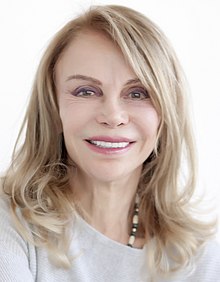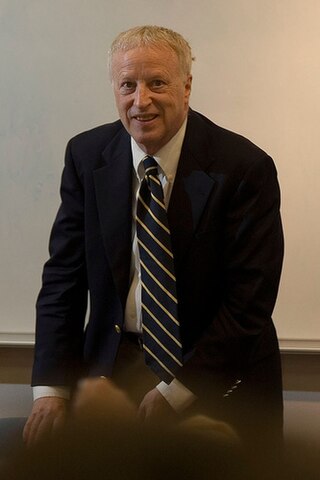
George Arthur Akerlof is an American economist and a university professor at the McCourt School of Public Policy at Georgetown University and Koshland Professor of Economics Emeritus at the University of California,Berkeley. Akerlof was awarded the 2001 Nobel Memorial Prize in Economic Sciences,jointly with Michael Spence and Joseph Stiglitz,"for their analyses of markets with asymmetric information."

Ross McKitrick is a Canadian economist specializing in environmental economics and policy analysis. He is a professor of economics at the University of Guelph,and a senior fellow of the Fraser Institute.
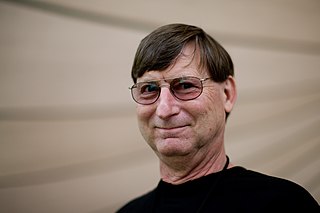
Hal Ronald Varian is Chief Economist at Google and holds the title of emeritus professor at the University of California,Berkeley where he was founding dean of the School of Information. Varian is an economist specializing in microeconomics and information economics.
Paris Dauphine University - PSL is a Grande École and public institution of higher education and research based in Paris,France. As of 2022,Dauphine has 9,400 students in 8 fields of study,plus 3,800 in executive education. Its status as a grand établissement,adopted in 2004,allows it to select its students. On average,90 to 95% of accepted students received either high distinctions or the highest distinctions at their French High School National Exam results. While not itself having the legal status of a public university,it is a constituent college of PSL University. Dauphine is also a member of the Conférence des Grandes Écoles.

Maurice Moses "Maury" Obstfeld is a professor of economics at the University of California,Berkeley and previously Chief Economist at the International Monetary Fund. He is also a nonresident senior fellow at the Peterson Institute for International Economics.
James Harold Stock is an American economist,professor of economics,and vice provost for climate and sustainability at Harvard University. He is co-author of Introduction to Econometrics,a leading undergraduate textbook,and co-editor of the Brookings Papers on Economic Activity. Stock served as a Chair of the Harvard Economics Department from 2007 to 2009 and as a member of President Obama's Council of Economic Advisers from 2013 to 2014.

Esther Duflo,FBA is a French–American economist who is the Abdul Latif Jameel Professor of Poverty Alleviation and Development Economics at the Massachusetts Institute of Technology (MIT).

Inez Fung is a professor of atmospheric science at the University of California,Berkeley,jointly appointed in the department of earth and planetary science and the department of environmental science,policy and management. She is also the co-director of the Berkeley Institute of the Environment.

Carmen M. Reinhart is a Cuban-American economist and the Minos A. Zombanakis Professor of the International Financial System at Harvard Kennedy School. Previously,she was the Dennis Weatherstone Senior Fellow at the Peterson Institute for International Economics and Professor of Economics and Director of the Center for International Economics at the University of Maryland. She is a research associate at the National Bureau of Economic Research,a Research Fellow at the Centre for Economic Policy Research,Founding Contributor of VoxEU,and a member of Council on Foreign Relations. She is also a member of American Economic Association,Latin American and Caribbean Economic Association,and the Association for the Study of the Cuban Economy. She became the subject of general news coverage when mathematical errors were found in a research paper she co-authored.

Benjamin Zachary Bronfman is an American businessman and musician. Bronfman is a founding partner and board member of Global Thermostat,a direct air capture company that removes carbon dioxide from the atmosphere.
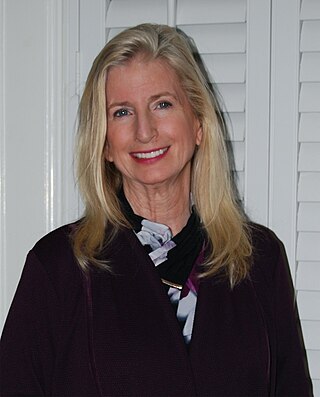
Marilyn A. Brown is a Regents' and Brook Byers Professor of Sustainable Systems in the School of Public Policy at the Georgia Institute of Technology. She joined Georgia Tech in 2006 after 22 years at Oak Ridge National Laboratory,where she held various leadership positions. Her work was cited by President Clinton as providing the scientific justification for signing the 1997 Kyoto Protocol. With Eric Hirst,she coined the term "energy efficiency gap" and pioneered research to highlight and quantify the unexploited economic potential to use energy more productively.
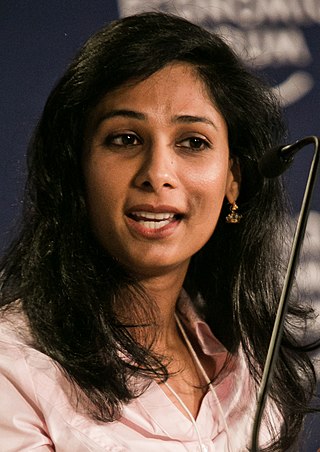
Gita Gopinath is an Indian-American economist who has served as the first deputy managing director of the International Monetary Fund (IMF),since 21 January 2022. She had previously served as chief economist of the IMF between 2019 and 2022.

Padma Desai was an Indian-American development economist who was the Gladys and Roland Harriman Professor of comparative economic systems and director of the Center for Transition Economies at Columbia University. Known for her scholarship on Soviet and Indian industrial policy,she was awarded the Padma Bhushan in 2009.
Ulrike M. Malmendier is a German economist who is currently a professor of economics and finance at the University of California,Berkeley. Her work focuses on behavioral economics,corporate finance,and law and economics. In 2013,she was awarded the Fischer Black Prize by the American Finance Association.
Richard Ferris Muth was an American economist who is considered to be one of the founders of urban economics.
Glenn David Ellison is an American economist who is the Gregory K. Palm Professor of Economics at the Massachusetts Institute of Technology (MIT) and an Elected Fellow of the Society for the Advancement of Economic Theory and American Academy of Arts &Sciences. He is the father of Caroline Ellison,an American felon and former CEO of Alameda Research.
Alessandra Casella is an economist,researcher,professor,and author. Currently,she is an Economics and Political Science professor at Columbia University.
Carolyn Fischer is an environmental economist. She was born in Ontario,later moving to the United States. She is a senior fellow for Resources for the Future,as well as being a Canada 150 Research Chair in Climate Economics,Innovation,and Policy. She is also a professor of environmental and natural resource economics at Vrije Universiteit-Amsterdam.

Alissa M. Kleinnijenhuis is a Dutch economist. She is a Visiting Assistant Professor of Finance at the Samuel Curtis Johnson Graduate School of Management,at Cornell University. Her research addresses salient questions in finance,particularly in climate finance.
Eduardo Jose Chichilnisky is an Argentine-born neurobiologist and academic. He has worked at Stanford University since 2013,and serves as John R. Adler Professor of Neurosurgery.
